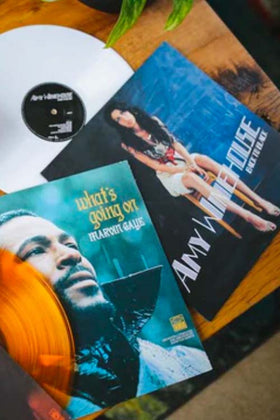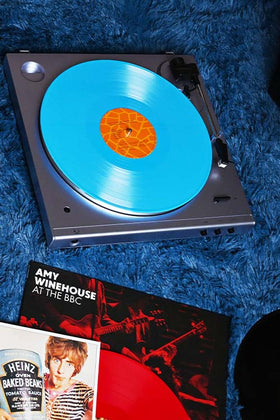Speakers for Record Players: Which Are Best?
Any vinyl enthusiast knows that one of the biggest reasons for collecting records is the sound. Vinyl records have a warm, nuanced audio tone that no other medium can approach. However, to get the best out of your records, it’s important to have the right speakers to amplify the sweet tones of your favorite tunes.
In this article, we’ll give you some basic advice on what kinds of speakers are available for record players and which ones might be best for you.
What Are the Types of Speakers for Record Players?
Speaker shopping can be a little overwhelming. A simple internet search brings back hundreds of speakers, each with a long list of technical features. Fortunately, you can start understanding those features by breaking speakers down into a few categories.
Speaker Category 1: Included, Bookshelf, or Floor-Standing?
One of the first things you should consider when choosing a speaker is where they will be placed. The type of speaker you can use is limited by how much space you have for them.
The simplest speaker type is included. These speakers are built into your record player and are usually found on beginner-level turntables. They don’t need any separate shelf or floor space and don’t require any special setup either.
Next are bookshelf speakers, which are separate from your turntable but small enough to fit on a bookshelf nearby. Bookshelf speakers usually need to be connected to your turntable, either with cables or using wireless technology like Bluetooth. One thing to watch out for with this type of speaker is shelf vibration, which can muddy the sound but can be easily fixed by placing your speakers on a separate stand or table.
The last category is floor-standing or free-standing. These speakers are usually quite large and need to have their own floor space or end table to rest on. Because they’re bigger, they can often produce more complex sound quality, making them a good choice for big rooms and high-end turntables.
Speaker Category 2: Powered or Passive?
This category is about power and where your speakers get it from. Powered (also called active) speakers plug into the wall and usually have their own built-in amplifier. Once you plug your turntable into them, you’re ready to listen to your records.
Passive speakers, on the other hand, don’t plug into the wall. Because they don’t have an external power source, they need to be plugged into a powered amplifier in order to get any sound out of them. Passive speakers can be a little trickier to set up because they require an extra piece of equipment and the know-how to get everything connected.
You may wonder why passive speakers are on the market, but the truth is that their lack of an amplifier makes their design possibilities much more flexible. Passive speakers are available in many different shapes, sizes, and designs. Powered speakers are usually large due to the included amplifier and generally have to stick to square bookshelf models.
Speaker Category 3: Sound Quality
This is the most important category and also the most complicated. There are a lot of different specs for speaker sound. We can’t list them all here in detail, but there are a few things you should keep an eye out for.
When you’re buying speakers, these are some of the features you should look for and compare between models.
- Power handling
- Sensitivity
- Frequency response
- Woofer size
There are a lot of variables that contribute to sound quality — not only the speaker specs, but the room size, the turntable, and even what kind of music you play can matter. For example, if you play a lot of bass-heavy hip hop, you’ll want speakers with a big bass woofer and high power handling. If your vinyl collection is mostly delicate operas, go for high sensitivity and frequency response.
If accurate sound is important to you, look into getting a pair of studio monitors. These are the speakers used by music producers and other professionals due to the sound quality they produce. It’s important to place studio monitors properly to get the best sound — we have a handy guide on how.
What Else Should You Consider When Buying Speakers for Record Players?
Even if you’re not a tech whiz, if you’re a vinyl enthusiast, you probably already have a natural instinct for what does and doesn’t sound good naturally. You’ll be able to find the speakers that are right for you with just a little extra effort. Outside of tech talk, here are a few other things you should consider.
Personal Expertise
If you’re an audio whiz with a private studio, feel free to get the biggest bookshelf speakers with Bluetooth connectivity, P2P bracing techniques, and a silk dome tweeter.
If the previous sentence didn’t entirely make sense to you, consider getting a simpler turntable with included speakers. There’s nothing wrong with starting small and working your way up as you learn more about sound equipment.
Available Space
Think about the space your record player takes up. If it’s on a shelf with lots of space, you can get big bookshelf speakers to go with it. If your space is a bit more limited, think of getting a set of passively-powered mini cubes or another space-saving speaker design.
The same goes for the entire room. If you have big rooms with good acoustics that can take a lot of sound, getting speakers with a big sound and nuanced audio features is a good idea. Smaller speakers are the way to go if you live in a smaller space or have noise-sensitive neighbors.
Budget
Speaker prices have a pretty broad range, and it might seem that higher-end audio equipment quickly gets prohibitive in price. However, once you decide what features are most important to you, it’s possible to find exactly what you’re looking for in your price range. Making a list of what you want, setting a firm budget, and doing a little research on the sound quality specs can help.
Aesthetics
Speakers have a wide variety of finishes, just like other types of audiovisual equipment. Aside from the options for different sizes and shapes, you can also get speakers in different colors and materials, such as bamboo or wood. If aesthetics are important to you, check if your preferred sound equipment comes in a look that matches your decorative style.
Can You Find the Best Speakers for Your Record Player?
If you have a basic grasp of record player speaker technology, you’ll be able to find the best speakers for your turntable. While it may not seem like a lot, knowing some basic sound quality terminology can get you moving in the right direction while shopping. If you also know if you want powered or passive speakers and have an idea of the type of space you want your speakers to take up, you’re on the road to a good speaker shopping experience.
If you’re ready to get some vinyl to play on your new speakers, take a look at our catalog at Sound of Vinyl.
Sources
10 Best Speakers For Vinyl in 2021 (Review) | Music Critic
Speaker specifications: A consumer guide | CNET
6 Best Speakers to Make Your Vinyl Sound Terrific | House and Beyond




